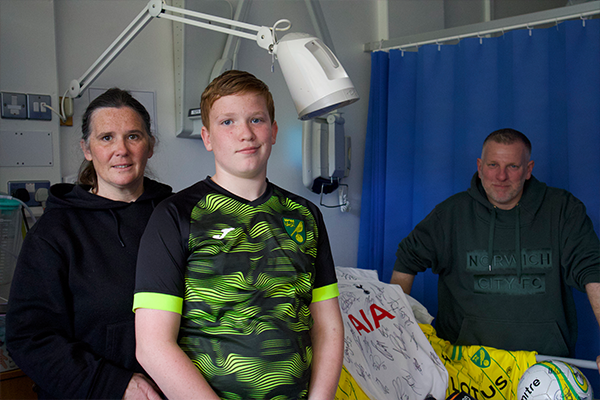The family of a boy who suffered a stroke on the football pitch, say a hospital that treats mental and physical health together is "desperately needed". Austin, 13, from Thetford, has just returned to the pitch after three-and-a-half months.

The teenager, who was playing in goal for Thetford Bulldogs on 21 May, had to be taken off during the game after feeling unwell, and he later collapsed at home.
Austin was very quickly transferred from his local hospital in Bury St Edmunds in Suffolk, to Addenbrooke's Hospital in Cambridge where he was diagnosed with a stroke, most likely caused by narrowed blood vessels in the brain.
Watch Austin's story
Link: https://www.youtube.com/watch?v=e0N7gSJctuE
Austin was left paralysed on one side of his body. He had to learn how to walk and talk again.
He desperately needed physical healthcare support, but the rehabilitation and impact of the stroke also had a huge effect on Austin’s mental health.

Having a dedicated children’s hospital that will support a child’s mental health in the recovery, as well as their physical injuries, is desperately needed.
Paul Dale, Austin's dad
Austin’s dad Paul Dale said: “The symptoms were there as a stroke, but we didn’t think that would happen to a 13-year-old kid.
“He mimed to us, ‘Do you still love me?’ And that definitely hit home.”

The teenager received around 300 cards from all over the country and video messages of support from footballers and Premier League stars including England’s James Maddison, Norwich City Goalkeeper Angus Gunn, and TV Presenter/ Actor Danny Dyer, to help boost his mental health and physical recovery.
Austin then surprised doctors with his progress and continued to make a speedy recovery. He was able to return home and leave hospital after two weeks.
Just three-and-a-half months later, Austin has now returned to the pitch and is back doing what he loves - playing football.

His dad Paul said: “We were quite nervous about him returning to football, exactly 15 weeks to the day he had a stroke.
“But he did amazingly well. We were apprehensive, but everybody was proud to see him back on the pitch.
"Having a dedicated children’s hospital that will support a child’s mental health in the recovery, as well as their physical injuries, is desperately needed.”

Cambridge Children's Hospital will provide ‘whole child’ care to childhood stroke patients like Austin and will be the first to truly provide mental and physical health care together under one roof, delivered by staff who are trained in both.
It is the first specialist children’s hospital for the East of England, the only region in the UK without one.
The facility will have single bedded rooms, dedicated family areas and spaces for specialised services like rehabilitation, psychological support and physiotherapy, to help children and young people reach their full potential.

Dr Isobel Heyman, Clinical Co-Lead for mental health at Cambridge Children’s Hospital said:
“A lot of people don’t realise a child can have a stroke, but around 400 children a year in the UK do have a stroke.
“Treating children holistically in Cambridge Children’s Hospital is a whole new way.
“Physically we will have children’s mental health wards, next to paediatric wards. But we will also have beds where either type of patient can be accommodated, which is so important for reducing stigma.”
You can learn more about Austin’s story and recovery in the ITV Anglia report here. (opens in a new tab)
